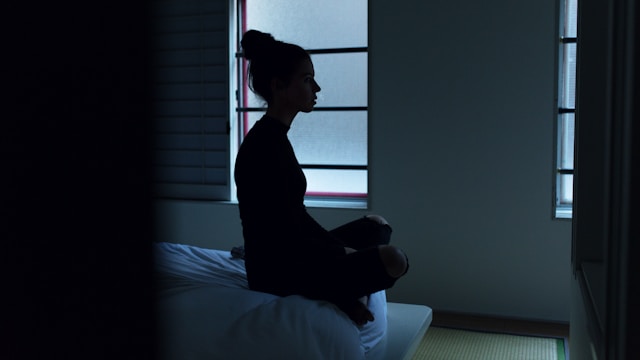
Insomnia not only depletes your energy and alters your mood, but it can also create a detrimental cycle impacting your health, work performance, and overall quality of life. Individuals grappling with insomnia often exhibit common symptoms such as struggling to fall asleep, early morning awakenings, frequent nighttime disturbances, daytime fatigue, irritability, depression, anxiety, and difficulty concentrating.
If you’re contending with sleep deprivation, consulting your doctor is crucial, as it may be connected to conditions like obesity, diabetes, and heart disease. To combat insomnia, consider making adjustments to your sleeping habits—simple modifications in lifestyle and routine can pave the way for the quantity and quality of sleep you need. And if you want to know more about that, then this post is for you!
What is Insomnia?
Insomnia, a prevalent sleep disorder, poses challenges in falling and staying asleep, leading to early awakenings and persistent fatigue upon waking. This condition not only depletes energy levels and impacts mood but also extends its reach to affect overall health, work performance, and one’s quality of life.
Individual sleep requirements vary, with most adults needing between 7 to 9 hours of sleep each night. While short-term insomnia, lasting days or weeks, often results from stress or distressing events, some individuals grapple with chronic insomnia lasting three months or more. Chronic insomnia may be a standalone issue or connected to underlying medical conditions or medication.
The good news is that enduring sleepless nights is not a necessity. Simple adjustments to daily habits can often provide relief and promote restful sleep.
Most Common Symptoms of Insomnia
Symptoms of insomnia can manifest as:
- Difficulty falling asleep at night.
- Awakening during the night.
- Rising too early.
- Experiencing daytime tiredness or sleepiness.
- Feeling irritable, depressed, or anxious.
- Struggling with attention, focus, or memory.
- Making increased errors or encountering more accidents.
- Persistent concerns and anxieties about sleep.
How to Conquer Your Insomnia
1. Establish a Consistent Sleep Schedule
Choose a regular bedtime and wake-up time, maintaining this routine daily, even on weekends. Consistency helps your body adapt to a predictable pattern, making it easier to fall asleep at night and wake up refreshed in the morning. Maintaining a consistent schedule enhances alertness, whereas irregular sleep hours during the week can leave you feeling groggy. Avoid oversleeping on weekends, as it disrupts your routine for the upcoming week.
2. Transform Your Bedroom into a Tranquil Haven
Ensure your bedroom provides a peaceful setting conducive to rest and sleep. Control noise, lighting, and temperature to create an environment that supports sound sleep. If a pet sharing your sleeping space disrupts your rest, consider relocating it. Additionally, invest in a comfortable mattress and bedding, as the right sleep surface contributes significantly to a restful night.
3. Limit or Eliminate Caffeine After 2 pm
Reduce or eliminate caffeine intake, especially after 2 pm. While a mid-afternoon coffee may boost energy, consuming additional caffeine later in the day can interfere with nighttime sleep. Caffeine has a long half-life of six hours, and its cumulative effects can disrupt your sleep-wake cycle. Opt for alternatives like protein-rich snacks, whole grains, plenty of water, or a brisk walk to maintain energy without compromising sleep.
4. Incorporate Moderate Daily Exercise
Regular exercise is a proven remedy for better sleep. Engage in moderate exercises such as walking or swimming, especially if don’t have enough gym equipment at home and you’re not a fan of intense workouts. Avoid vigorous activities close to bedtime, as they may stimulate wakefulness. Being physically active during the day helps reduce stress hormones that can interfere with nighttime sleep.
5. Avoid Alcohol Three Hours Before Bed
While alcohol may induce drowsiness, it disrupts the most rejuvenating type of sleep—REM sleep. Saying no to alcohol at least three hours before bedtime ensures a more restful sleep experience. Alcohol acts as a diuretic, increasing the likelihood of waking up during the night to use the bathroom. Steering clear of alcohol closer to bedtime helps maintain quality sleep.
6. Evaluate Your Medications
Review your medications, as some common prescriptions and over-the-counter drugs can disrupt sleep. Certain medications for conditions like high blood pressure and asthma may lead to insomnia. Pain relievers and cold medications often contain stimulating ingredients, making it challenging to fall asleep. If you suspect your medications are affecting your sleep, consult your healthcare provider for potential adjustments or alternatives.
When to See a Doctor
If insomnia begins to impede your daily activities, it is advisable to consult your doctor or another primary care professional. Your healthcare provider will investigate the root cause of your sleep difficulties and assist in devising an appropriate treatment plan. In cases where a sleep disorder is suspected, your doctor may recommend visiting a specialized sleep centre for comprehensive testing.












